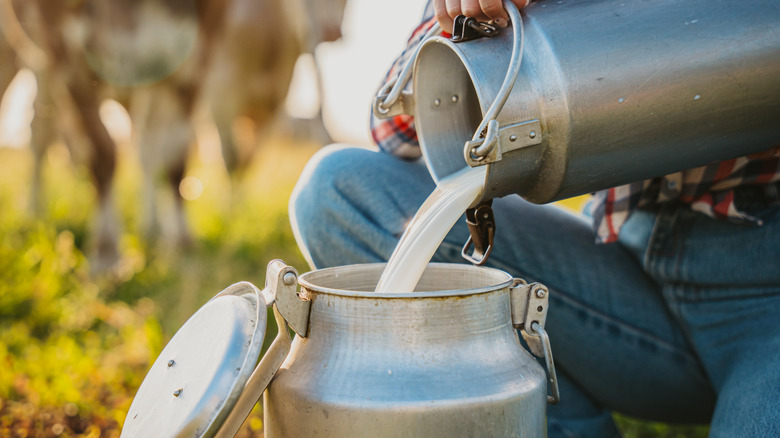Bird Flu Cases In Cows Lead Michigan Officials To Issue Raw Milk Warning
For those Michiganders who enjoy a glass of raw cow's milk, Michigan's Department of Health and Human Services and Department of Agriculture and Rural Development are cautioning against consumption due to the detected presence of bird flu in herds of cattle in the state. H5N1 highly pathogenic avian influenza (HPAI) moves easily among animals and is currently present in flocks of domestic chickens, wild animals, and at least two humans in the U.S. The threat to raw milk supplies lies in the fact that pasteurization effectively kills the virus, a process that raw milk doesn't undergo.
Raw milk is touted for a plethora of supposed health benefits. Enthusiasts claim when milk is pasteurized — a process that has been around since the 19th century — that nutrients are stripped away. Research into these assertions has proven that any loss in vitamins, amino acids, and proteins is minimal as pasteurized milk retains nearly all of the relevant nutrients as raw milk.
The benefit of pasteurization, on the other hand, is the elimination of a host of harmful microbes. Campylobacter, E. coli, Salmonella, and — you guessed it — influenza are just a few of the pathogens that pasteurization removes from milk.
Raw milk isn't worth it
While it might seem obvious to avoid raw milk or other products, such as cheese, from sick cattle, a specific claim made by those who promote raw milk consumption makes it imperative for health officials to sound an alarm. It is believed by some that raw milk contains properties that naturally combat or eliminate bacteria and viruses. This has been proven to be untrue. While not all raw milk will carry these various germs in loads significant enough to cause illness, it is without question safer to err on the side of caution and consume only milk and dairy products that have been pasteurized.
H5N1 is most commonly found in birds but is increasingly being detected in mammals, which has surprised health officials at the national level. It was thought that cattle and goats were not vulnerable to the avian flu, but monitoring has disproven that theory. More than two dozen dairy herds in at least eight states have been infected so far. Further, there has been at least one confirmed case of H5N1 being passed from a cow to a human, though it was a worker on a cattle farm in Texas with close contact and not the result of the consumption of raw milk.

